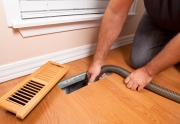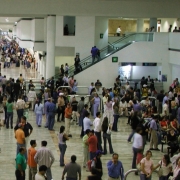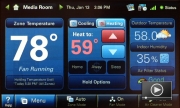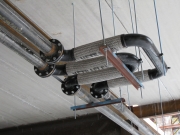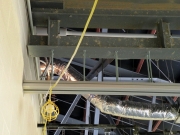Many homeowners don’t know that the “fiscal cliff” legislation signed into law by President Obama on January 2 contains significant potential savings for them. The legislation reinstates a 10% tax credit (up to $500 on the installed cost) for making qualified energy-efficient improvements.

23 05 00 Common Work Results for HVAC
Carbon Monoxide Is an Unwelcome Holiday Houseguest
You can see your home looking its best for the holidays – cleaned from top to bottom, with sparkling holiday decorations and smiling friends and family gathered to help celebrate – but what you can’t see in your home could spoil everything.
Use Facebook to Let Low-Income Families Know: "You've Got a Friend"
Service Experts Heating & Air Conditioning and the Salvation Army are raising $10,000 to help low-income households pay heating bills during the upcoming cold winter months. For every new Facebook Like on the Service Experts Facebook page during the month of December, the company will donate $1 to the Salvation Army Housing and Homeless Services program, up to $10,000.
Controlling Building Ventilation: CO2 Sensors
Carbon dioxide (CO2) is a by-product of human respiration. Each time we exhale, CO2 is released into the atmosphere around us. Currently, CO2 sensors can be used to automatically control ventilation systems in buildings equipped with Building Automation Systems (BAS). This is referred to as Demand Control Ventilation (DCV).
Product Spotlight: Trane ComfortLink II Thermostat
The ComfortLink™ II Thermostat from Trane is the company’s latest and most innovative offering. With its 7" interactive high-definition color touch screen, the product is the ultimate home comfort connection. Providing an intuitive user interface, the thermostat serves as an easy-to-use central planning center for the home, bringing year-round home comfort and control right to one’s fingertips. The ComfortLink II Thermostat will launch in early 2011 and, even before its official debut, has already been named a Consumer Electronics Show (CES) Best of Innovations 2011 Honoree and winner of the Popular Mechanics 2010 Breakthrough Award.
Energy Recovery Ventilation Systems
Energy recovery ventilation systems provide a controlled way of ventilating a home while minimizing energy loss. They reduce the costs of heating ventilated air in the winter by transferring heat from the warm inside air being exhausted to the fresh (but cold) supply air. In the summer, the inside air cools the warmer supply air to reduce ventilation cooling costs.
Whole-House Balanced Ventilation Systems
Balanced ventilation systems, if properly designed and installed, neither pressurize nor depressurize a house. Rather, they introduce and exhaust approximately equal quantities of fresh outside air and polluted inside air, respectively.
Whole-House Supply Ventilation Systems
Supply ventilation systems work by pressurizing the building. They use a fan to force outside air into the building while air leaks out of the building through holes in the shell, bath and range fan ducts, and intentional vents (if any exist).
Whole-House Exhaust Ventilation Systems
Exhaust ventilation systems work by depressurizing the building. By reducing the inside air pressure below the outdoor air pressure, they extract indoor air from a house while make-up air infiltrates through leaks in the building shell and through intentional, passive vents.
Whole-House Ventilation
The decision to use whole-house ventilation is typically motivated by concerns that natural ventilation won't provide adequate air quality, even with source control by spot ventilation.
Spot Ventilation
Spot ventilation improves the effectiveness of other ventilation strategies — natural and whole-house — by removing indoor air pollutants and/or moisture at their source.
Natural Ventilation
Natural ventilation used to be the most common ventilation method of allowing fresh outdoor air to replace indoor air in a home. Today it's usually not the best ventilation strategy, especially for homes that are properly air sealed for energy efficiency. Natural ventilation also usually doesn't provide adequate moisture control.
Ventilation
When creating an energy-efficient, airtight home through air sealing techniques, it's very important to consider ventilation. Unless properly ventilated, an airtight home can seal in indoor air pollutants. Ventilation also helps control moisture—another important consideration for a healthy, energy-efficient home.
Expansion Fittings and Loops for HVAC Piping
Expansion fittings and loops may be required in any piping system which contains fluids with temperatures elevated above normal room temperature. Most piping in commercial systems is comprised of metals; common piping materials include copper, black iron, steel and stainless steel. When heat is applied to metal, it undergoes thermal expansion. The rate of expansion depends upon the metal and the heat being applied. In piping, there are two directions in which thermally expansion can take place: circumferential and longitudinal. Circumferential lengthening is negligible and therefore is not a concern. But longitudinal expansion, depending on how long a pipe is run, can be several inches or more. Because piping is rigid, if the change in length is not provided for via expansion fittings or loops, the pipes can shear the connections and cause ruptures. Different metals expand at different rates, but all expand with the addition of heat. Expansion fittings and loops allow the piping to expand without failure.
Duct Insulation
There are three purposes for duct insulation: to retard the flow of heat, to reduce the amount of duct-transmitted sound, and/or to act as a vapor barrier. To retard the flow of heat, ducts may be insulated on the inside with duct liner, or on the outside with duct wrap. To reduce the amount of duct-transmitted sound, a product called sound liner may be used. As a vapor barrier, ducts are usually wrapped with a vapor sealable material such as foil or plastic.
Testing, Adjusting, and Balancing for HVAC
This topic covers information related to testing, adjusting and balancing of heating, ventilation and air conditioning (HVAC) systems installed during construction. Testing evaluates HVAC equipment, adjusting sets devices within an HVAC system to achieve efficient performance during operation and balancing is performed to regulate air or water flow of an HVAC system.
